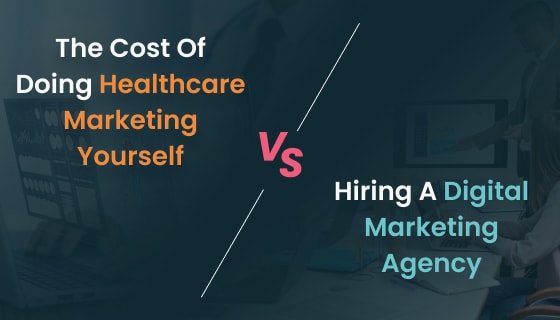The healthcare industry is making significant strides in many areas, but when it comes to marketing strategies, it often falls behind other consumer-driven industries. Why? Strict HIPAA regulations and FDA constraints limit how healthcare organizations can approach marketing. Additionally, with patient care being the primary focus, marketing strategies often take a back seat.
However, recent studies show a clear shift. Many consumers now book healthcare appointments online, with a significant portion preferring to book via their computer or smartphone. Even more telling, the CDC found that 58.5% of adults have used the internet in the last year to search for health or medical information.
It’s clear: consumers use online resources for everything from initial research to ongoing care. With this shift, healthcare organizations must prioritize digital marketing to increase patient engagement, improve care outcomes, and stay competitive in an ever-evolving industry.
Now, let’s take a moment to explore understanding the modern healthcare consumer and how their behaviors are shaping the future of healthcare marketing.
Understanding the Modern Healthcare Consumer
The healthcare industry has seen a significant shift in recent years, primarily driven by the increasing use of digital tools and technology. Today’s healthcare consumers are more informed, connected, and empowered. With easy access to vast amounts of health-related information online, patients are no longer passive care recipients but active participants in their healthcare decisions.
As healthcare marketing evolves to meet the needs of this modern consumer, providers must understand what drives today’s patients and how their expectations have changed. With the rise of digital platforms, patients demand more from their healthcare experience, reshaping how practices must operate.
The Evolving Expectations of Today’s Patients
Patients today expect more than top-quality care—they seek a seamless, personalized, and accessible healthcare experience, driven by their interactions with other industries where convenience and transparency are standard. They want to easily schedule appointments online, expect fast and clear communication, and demand transparency on procedures, costs, and recovery times. Additionally, they expect healthcare providers to offer personalized care that caters to their unique needs and preferences, improving their overall experience.
The Role of Digital Marketing in Meeting These Expectations
Healthcare providers must leverage digital marketing to engage today’s consumers to meet evolving patient expectations. It’s not just about ads; it’s about creating a patient-centric experience. Digital marketing enables instant access to information through a fast, user-friendly website, building trust and credibility. Social media also plays a vital role, allowing real-time patient interaction, sharing valuable content, and amplifying social proof through reviews and testimonials, enhancing reputation and attracting new patients.

Adapting to the Digital-First Patient
As patient expectations evolve, healthcare marketing must adapt. Digital marketing offers the tools to meet today’s demands, as patients now expect a seamless, digital-first experience with easy access to information, simple bookings, and ongoing engagement.
Healthcare organizations must adopt digital-first strategies, from mobile-optimized websites to engaging on social media and ensuring transparent communication. Embracing these changes helps providers better serve patients and stay competitive.
Enhancing Patient Engagement through Digital Marketing
Effective patient engagement requires a modern, digital-first approach. Healthcare practices can improve patient experience and build lasting relationships by combining targeted campaigns and a strong online presence.
Targeted Campaigns and Personalization
Generic marketing won’t connect with today’s patients. Targeted digital campaigns allow practices to deliver relevant, personalized messages to the right audience. Using patient data to tailor communication increases engagement, making patients feel valued and understood. This approach also ensures cost-effectiveness, as marketing efforts focus on those most likely to benefit from your services, driving long-term loyalty and retention.
Optimizing Online Presence for Trust and Accessibility
A well-optimized online presence is crucial for patient trust and satisfaction. A user-friendly website, active social media engagement, and positive reviews contribute to a seamless digital experience that makes connecting patients with your practice easier. By ensuring accessibility and transparency, healthcare providers can enhance engagement, build trust, and ultimately improve patient retention.
By combining targeted campaigns and an optimized online presence, healthcare providers can significantly enhance patient engagement and retention. However, leveraging digital healthcare marketing becomes essential to ensure the right patients find your practice. Digital marketing in healthcare offers a variety of tools—such as targeted campaigns, social media engagement, content marketing, and more—that can help you reach the right audience at the right time. Let’s start with one of the most critical components: SEO. Here’s how SEO can elevate your practice’s digital marketing efforts and help you stay ahead in the competitive healthcare market.
SEO: Your Healthcare Practice’s Secret Weapon
Being found online is crucial for attracting new patients, and SEO (Search Engine Optimization) is the key to making that happen. When patients search for healthcare providers, they often start with Google. You’re missing valuable opportunities if your practice doesn’t appear in search results.
Evaluate Your SEO Strategy
- Are you optimizing your website with relevant keywords that patients are searching for?
- Is your website’s content fresh and updated regularly to maintain relevance in search results?
- Are you focusing on local SEO to ensure your practice shows up for nearby patients?
- Are you monitoring your search rankings and traffic to track your progress?
Why SEO Is Crucial for Your Practice’s Visibility
SEO helps your practice appear in relevant search results, driving organic traffic to your website. A strong SEO strategy ensures that when patients search for services you offer, your practice is among the first they see.
How SEO Drives Patient Appointments
- Boosted Visibility: SEO ensures that your website ranks higher on search engines, making it easier for patients to find you.
- Targeted Traffic: By optimizing for specific keywords, you attract patients actively searching for services like yours.
- Local SEO: Focusing on local search terms ensures your practice appears in local search results, bringing in nearby patients ready to book appointments.
More patients will likely reach out for appointments when your practice is easy to find online. SEO is not just about ranking higher—it’s about being there when patients need you most.
Harnessing Social Media for Healthcare Marketing
Social media is a powerful tool for healthcare marketing, enabling you to build trust, foster community, and engage with current and potential patients. In today’s digital world, patients expect to interact with healthcare providers on platforms like Facebook, Instagram, and LinkedIn. A strong presence can help your practice become more approachable and relatable. To ensure you’re effectively leveraging social media, take a moment to reflect on key aspects of your approach.
Evaluate your social media engagement
- Are you posting regularly to engage and inform your audience?
- Do you respond promptly to patient inquiries or comments?
- Are you sharing content that educates and builds trust?
- By reflecting on these questions, you can identify areas to strengthen your social media approach.
Why Social Media Is Key to Building Trust and Engagement
A well-maintained social media presence enhances your credibility and allows for meaningful connections. It humanizes your practice, provides value through health tips, and keeps patients updated on services and events.
Building Community Through Social Media
- Fostering Patient Connection: Posting relevant content creates a sense of connection, where patients feel informed and involved.
- Increases Engagement: Social media allows direct patient interaction, from answering questions to receiving feedback.
- Showcases Expertise: Sharing educational content and patient success stories demonstrates your knowledge and commitment to care.
A strong social media strategy helps establish trust and encourages patient interaction, making your practice feel more personal and accessible. Engaging content and consistent communication build lasting relationships and enhance patient loyalty. By prioritizing social media, you can ensure your practice stays relevant and top-of-mind for current and potential patients.
Google Ads and PPC: A Game Changer for Healthcare Professionals
In today’s competitive healthcare market, simply having an online presence isn’t enough. Pay-per-click (PPC) campaigns like Google Ads can ensure your practice is visible to potential patients exactly when they are searching for healthcare services. With PPC, you only pay when someone clicks on your ad, making it a cost-effective way to drive targeted traffic to your practice. Consider the following key factors to determine if PPC is the right strategy for your practice.
Evaluate your PPC readiness
Think about these questions as you assess your practice’s potential for Google Ads and PPC campaigns:
- Are your digital marketing efforts focused on targeting patients who are actively searching for your services?
- Do you track the performance of your ads to ensure they’re driving meaningful results?
- Are you utilizing PPC to reach specific patient groups or local communities needing your services?
Why PPC is essential for staying competitive
PPC campaigns offer immediate visibility on search engines, ensuring your practice appears at the top when patients search for your services. This visibility is critical in attracting patients actively seeking care, giving you a direct path to new appointments.
How PPC Drives Patient Appointments
- Instant Visibility: Ads appear in search results when patients seek specific healthcare services, ensuring your practice is seen immediately.
- Targeted Reach: With PPC, you can target specific keywords, locations, and demographics, ensuring your message reaches the most relevant audience.
- Measurable Results: PPC provides precise data on the effectiveness of your ads, allowing you to optimize your campaigns for maximum return on investment.
Investing in PPC ensures your practice gets the attention it deserves when patients need you the most. With a tailored approach, you can maximize visibility and patient engagement. A well-executed PPC strategy will help drive new appointments, boost your online presence, and keep you ahead in a competitive healthcare market.
Measuring the Impact: Analytics for Healthcare Marketing
In healthcare marketing, data is more than just numbers—it’s a tool that helps you understand your patients, refine your strategies, and improve your results. You can make data-driven decisions that enhance your marketing efforts by using analytics to track patient behaviors, engagement, and conversions.
Assess Your Analytics Strategy
- Are you tracking the right metrics to measure the effectiveness of your marketing campaigns?
- Do you analyze patient engagement and behavior to identify trends and opportunities?
- Are you using data to make informed decisions that optimize your marketing strategy?
Why Data Analytics Matter in Healthcare Marketing
Data Analytics gives you a clear view of how well your marketing efforts are performing. By tracking key metrics, you can identify which strategies drive patient engagement and which areas need improvement.
How Data Optimizes Your Marketing Strategy
- Understand Patient Behavior: Analyzing how patients interact with your website, social media, and ads can provide valuable insights into their needs and preferences.
- Measure Campaign Success: Analytics allow you to track which campaigns generate the most traffic, conversions, and appointments, helping you allocate resources effectively.
- Refine Your Strategy: With real-time data, you can continuously refine your approach, test new strategies, and optimize for better results.
By leveraging data analytics, you can make informed decisions directly impacting your practice’s growth. Consistently measuring and refining your strategy ensures you stay ahead of patient needs and market trends. Ultimately, analytics empower you to optimize your marketing efforts for long-term success.
Conclusion
We’ve explored how digital marketing can elevate your healthcare practice’s outreach, patient engagement, and long-term growth.
By embracing strategies like personalized messaging, leveraging patient data, and utilizing targeted campaigns, you can ensure that your marketing reaches the right audience and builds strong, lasting relationships with your patients.
The key takeaway? Your digital marketing strategy must be tailored to meet your business goals and patients’ needs. Investing in a data-driven, AI-powered approach will optimize your outreach, improve patient experience, and set the stage for sustainable success.
If you’re ready to optimize your digital marketing efforts and stay ahead of the competition, ZealousWeb is here to help. With our expertise in healthcare marketing and advanced healthcare digital marketing solutions, we can refine your strategy, engage patients more effectively, and ensure your practice thrives in an increasingly digital world. We hope this blog has provided valuable insights to help you enhance your healthcare marketing strategy.













